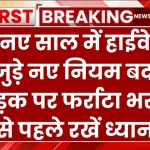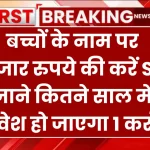
Fixed Deposits (FDs) are one of the safest and most preferred investment options for individuals looking for stable returns. However, before you invest, it is crucial to understand the essential aspects of FDs to avoid financial regrets later. Whether you are a beginner or an experienced investor, this guide will help you make informed decisions about Fixed Deposits.
Fixed Deposit Important Things to Know Before Investing
| Key Aspect | Details |
|---|---|
| Interest Rates | Varies from 3% to 8.5% based on tenure and bank |
| Tenure | Ranges from 7 days to 10 years |
| Premature Withdrawal | Penalty between 0.5% to 1% of the interest rate |
| Taxation | Interest is taxable under “Income from Other Sources” |
| Insurance Cover | Deposits up to ₹5 lakh insured by DICGC |
| Inflation Impact | Returns may be lower than inflation over time |
Fixed Deposits remain a reliable and low-risk investment option, but they require careful planning. By comparing interest rates, understanding tax implications, and diversifying investments, you can make smarter FD choices. Always stay updated with financial regulations and consider inflation-adjusted returns to maximize your wealth.
What is a Fixed Deposit?
A Fixed Deposit (FD) is a financial instrument offered by banks and non-banking financial companies (NBFCs) where you deposit money for a fixed period at a predetermined interest rate. The bank pays you interest at regular intervals or at maturity, ensuring steady returns.
FDs are considered safe because they offer capital protection and guaranteed returns. However, they also come with certain limitations, such as penalties on early withdrawals and tax implications.
see also: Top 6 Banks Offering 7.85% Interest on Fixed Deposits
Advantages of Fixed Deposits
1. Guaranteed Returns
Unlike market-linked investments, FDs provide fixed and predictable returns. This makes them ideal for risk-averse investors.
2. Flexibility in Tenure
FDs come with various tenures ranging from 7 days to 10 years, allowing investors to align their deposits with financial goals.
3. Low Risk
FDs are one of the safest investment options as they are not affected by market fluctuations.
4. Loan Facility
Many banks allow you to take a loan against your FD, typically up to 90% of the deposit amount.
5. Insurance Cover
FDs up to ₹5 lakh per bank are insured by the Deposit Insurance and Credit Guarantee Corporation (DICGC), ensuring safety even in case of a bank failure.
Things to Consider Before Investing in a Fixed Deposit
1. Compare Interest Rates
Banks and NBFCs offer different FD interest rates. It is advisable to compare rates across various institutions before making a decision. Senior citizens usually get an additional 0.25% – 0.50% interest on FDs.
- Example: SBI offers up to 7.10% interest, while Bajaj Finserv FD offers up to 8.60%.
- Tip: Check the latest interest rates on BankBazaar.
2. Understand Tax Implications
Interest earned on FDs is taxable under Income from Other Sources and is subject to Tax Deducted at Source (TDS) if it exceeds ₹40,000 (₹50,000 for senior citizens) in a financial year.
- Tip: To avoid TDS deduction, submit Form 15G/15H if your income is below the taxable limit.
3. Inflation vs. FD Returns
Inflation can reduce the real value of your FD returns. If inflation is at 6% and your FD earns 5.5%, your real returns are negative.
- Solution: Consider diversifying with other investment options like mutual funds and stocks to balance returns.
4. Premature Withdrawal Penalty
Withdrawing your FD before maturity attracts a penalty of 0.5% to 1% of the agreed interest rate.
- Tip: Choose flexible FDs that allow partial withdrawals without penalties.
5. Deposit Insurance Limit
Although FDs are safe, deposits above ₹5 lakh are not covered under DICGC insurance.
- Solution: If you have more than ₹5 lakh to invest, split your FD across multiple banks for better protection.
Types of Fixed Deposits
1. Regular Fixed Deposit
The most common FD where you deposit a lump sum amount and receive interest at maturity.
2. Tax-Saving Fixed Deposit
- Lock-in period: 5 years
- Tax exemption under Section 80C (up to ₹1.5 lakh per year)
- No premature withdrawal allowed
3. Senior Citizen FD
- Higher interest rates (additional 0.25% – 0.50%)
- Better liquidity options
4. Flexi Fixed Deposit
- Linked to your savings account
- Auto-sweep feature for better returns with liquidity
5. Recurring Deposit (RD)
Ideal for salaried individuals who want to save monthly while earning FD-like returns.
see also: Sukanya Samriddhi Yojana How ₹24,000 Yearly Can Grow To ₹11,08,412 Over Time?
Fixed Deposit FAQs
1. Can I break my FD before maturity?
Yes, but it may attract a penalty ranging from 0.5% to 1% of the interest rate.
2. Which bank gives the highest FD interest rate?
Private and small finance banks generally offer higher FD rates compared to public sector banks. Check platforms like BankBazaar for updates.
3. Are FDs better than mutual funds?
FDs are safer but offer lower returns. Mutual funds can provide higher returns but come with market risks.
4. Can NRIs open Fixed Deposits in India?
Yes, NRIs can open NRE, NRO, or FCNR FDs with varying tax implications.
5. What happens if my bank fails?
Your FD is insured up to ₹5 lakh under DICGC insurance. Any amount beyond this is not protected.











